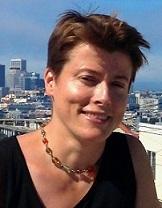Event

Jenny Reardon
For Whom the Genome Tolls: Race, Genomics and Justice in the American South at the Turn of the Millennium
While assembling the 3 billion nucleotide sequence of the human genome into machine-readable form might have been a tremendous technical feat, it left unanswered the fundamental question: what does the sequence mean? In the decade after the Human Genome Project, this turn to the question of meaning—the question of the uses, significance and values of the human genome sequence—marks what Professor Reardon calls the postgenomic condition. In this talk, Professor Reardon explores how in the wake of few biomedical breakthroughs, human genomics continued to generate hope through promises to generate a more just world. It focuses on the emergence of this strategy in efforts to recruit African Americans into human genomic research at the turn of the millennium. Based in fieldwork at the U.S. National Institutes of Health and historically black universities and colleges, this talk explores the opportunities, but also the problems for ethics, justice, and knowledge these efforts posed. It ends with reflections on what this turn to justice in human genomics reveals about the contemporary conditions of knowledge and politics.
Jenny Reardon is Professor of Sociology, Faculty Affiliate in the Center for Biomolecular Science and Engineering, and Director of the Science and Justice Research Center at the University of California, Santa Cruz. Professor Reardon's work seeks to innovate spaces and languages capable of facilitating reflection and deliberation in an age increasingly mediated by emergent new forms of technoscience. She is author of Race to the Finish: Identity and Governance in an Age of Genomics (Princeton University Press, 2005) and is currently working on a second book manuscript entitled The Postgenomic Condition: Ethics, Justice, Knowledge After the Genome.
**This event is co-sponsored with Office of Inclusion and Diversity, Perelman School of Medicine; Center for Africana Studies; and the Department of Sociology**
